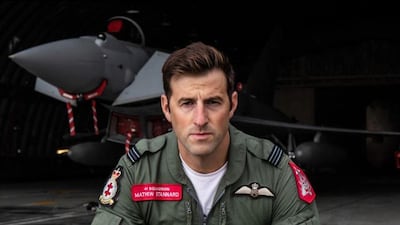It’s one small step for Britain’s fledgling space programme, and more importantly, perhaps, not a giant leap for the UK’s taxpayers.
Royal Air Force pilot Mathew Stannard has been selected to launch a satellite into orbit for the UK’s new £30 million (Dh135m) Space Force.
To do so, he will swap the cockpit of his Typhoon combat aircraft for the controls of a converted passenger jumbo jet.
The Boeing 747 is at the heart of Virgin Orbit, which is collaborating with the RAF to launch a surveillance satellite for Britain’s defence ministry.
It’s a low cost option that uses the 747 to carry a rocket to an altitude where it can detach and fire off into space.
Virgin Orbit is part of Sir Richard Branson's Virgin Group, which includes Virgin Galactic, the space tourism and scientific research company that earlier this year signed an agreement with the UAE Space Agency.
Renamed 'Cosmic Girl', the 747 once flew passengers from London to the US for Virgin Atlantic.
It will now carry a two stage rocket, called LauncherOne, with the capability of carrying up to 300kg into space.
Using an aircraft to carry the rocket for an air launch is much less expensive than a conventional ground launch, which requires a larger and more powerful single use first stage.
Still in the final stages of testing, the LauncherOne rocket is strapped under the wing of the 747 and flown to 35,000 feet, or nine kilometres.
After its release, the rocket free falls for four seconds, then ignites its engine, accelerating to nearly 13,000 kph.
At anywhere between 500 to 1,000 kilometres above the Earth, the nose cone of the rocket splits open to expose its satellite cargo.
The lower stage of the rocket is detached and burns up on reentry, while a second stage takes the satellite to the correct orbit and then ejects it.
With individual satellites able to be launched for as little as $12 million (Dh44m), the system is a budget opportunity for the UK to get back in the space race. Britain abandoned its own launch system back in the 1960's, when costs of the Blue Streak and Black Prince rocket launcher spiralled out of control.
Conventional ground launches can cost anywhere between $50 to $400 million. The explosion of a Space X rocket after launch in 2015, and the loss of two tonnes of cargo, is estimates to have cost around $260 million.
Virgin's Cosmic Girl is based in Long Beach, California, but can operate out of a number of airports, including Newquay Airport in Cornwall, a former RAF base now dubbed "Spaceport Cornwall", that currently flies mostly to a handful of UK and European destinations.
For the UK’s defence, using Virgin Orbit gives it the chance to deploy surveillance satellites quickly and precisely and making early warning systems much less vulnerable to disruption.
The first launch is scheduled for next year, with Flight Lieutenant Stannard saying: ““We’re in a new age. There’s lots of innovation these days. A decade ago what we’re doing now would be inconceivable.”
Britain has also become the first partner in the US led coalition Operation Olympic Defender, created to prevent hostile acts in space, with Virgin Orbit a key component.



